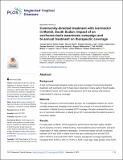Community-directed treatment with ivermectin in Maridi, South Sudan: Impact of an onchocerciasis awareness campaign and bi-annual treatment on therapeutic coverage
Publication Date
2025-09-19Type
Article, Journalviews
downloads
Metadata
Show full item recordCitation
TY - JOUR AU - Siewe Fodjo, Joseph Nelson AU - Okwii, Moses AU - Jada, Stephen AU - Hadermann, Amber AU - Rovarini, Jacopo AU - Amaral, Luís-Jorge AU - Nditanchou, Rogers AU - Bol, Yak AU - Logora, Makoy AU - Carter, Jane AU - Willems, Johan AU - Colebunders, Robert PY - 2025/09/08 SP - e0013493 T1 - Community-directed treatment with ivermectin in Maridi, South Sudan: Impact of an onchocerciasis awareness campaign and bi-annual treatment on therapeutic coverage VL - 19 DO - 10.1371/journal.pntd.0013493 JO - PLOS Neglected Tropical Diseases ER -
Abstract/
Background A high onchocerciasis disease burden and a low coverage of community-directed treatment with ivermectin (CDTI) have been observed in many parts of South Sudan. In the Maridi County, CDTI was re-introduced in 2017 and various interventions implemented to improve coverage. Methods Through successive community-based surveys, we investigated whether an onchocerciasis awareness campaign and a switch from annual to bi-annual distribution of ivermectin in Maridi County increased CDTI coverage. We also reviewed the evolution of ivermectin distribution in Maridi since 2017 and identified the determinants for ivermectin uptake. Results For past years in Maridi, CDTI programme performance has been highly variable due to security concerns, limited funding, misconceptions about ivermectin, and poor organisation of mass treatment campaigns. Community-based surveys conducted between 2018 and 2024 in Maridi found that upon switching from annual CDTI (2017–2019) to bi-annual CDTI (2021 onward), therapeutic coverage significantly increased from 40.8% in 2017 to 70.3% in 2023. Lower age, male gender, more CDTI information sources, and awareness of a link between onchocerciasis and epilepsy were all associated with increased uptake of ivermectin. Conclusion This study showed that with reinforced awareness raising accompanying biannual CDTI, a higher ivermectin treatment coverage is achievable. The findings present an opportunity for the health system to advance its onchocerciasis elimination scheme in remote, conflict-stricken communities in South Sudan.

